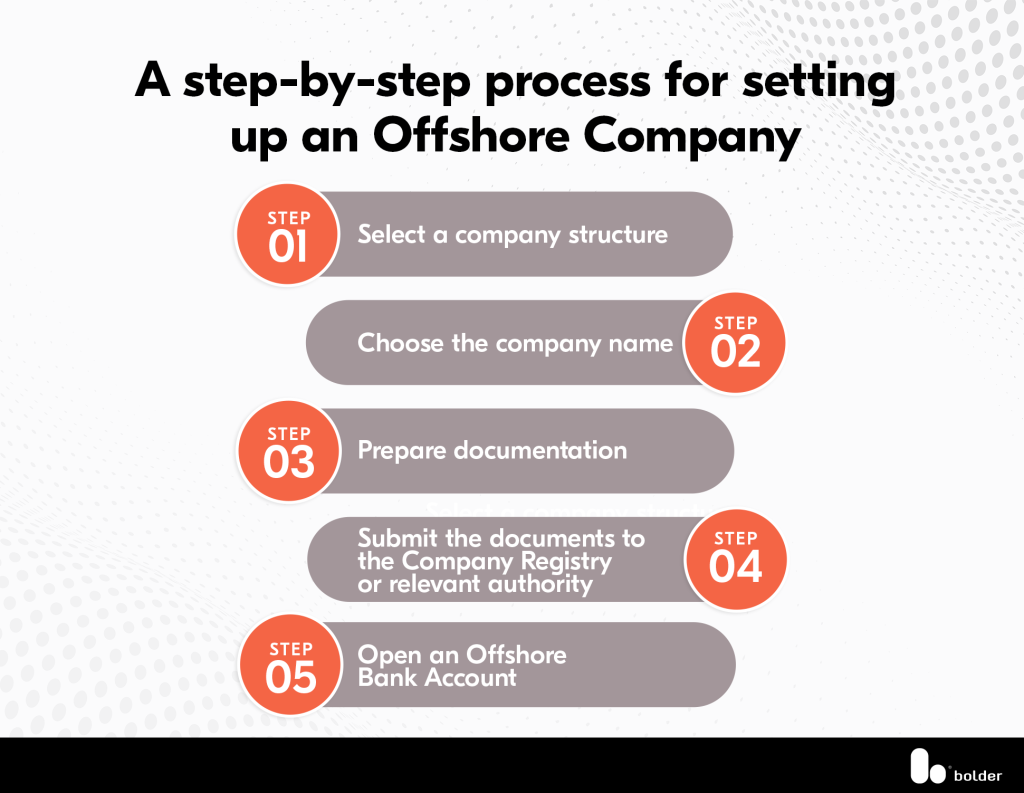Offshore Company Formations Case Studies: Actual Business Outcomes
Wiki Article
Demystifying Offshore Firm Formations: How They Operate and What to Anticipate
Offshore company formations can seem facility and enigmatic. Offshore Company Formations. These entities, commonly established for tax advantages and personal privacy, operate under unique lawful structures. Entrepreneurs may discover themselves navigating with a labyrinth of guidelines and compliance needs. Understanding the details is essential for success. What are the real benefits? What are the potential mistakes? A closer evaluation discloses the nuances that might impact decision-making significantlyUnderstanding Offshore Companies: Kinds and definitions
Offshore firms are entities developed in a jurisdiction beyond an individual's or business's primary country of home, usually for functions associated to tax obligation optimization, property security, or regulative benefits. These business can take different types, including limited liability firms (LLCs), international service companies (IBCs), and offshore depends on. Each type offers details functions and charms to various needs.Limited responsibility companies give proprietors with security from personal responsibility, while international service companies are prominent for their adaptability and minimal reporting needs. Offshore trusts, on the various other hand, are used mostly for estate preparation and asset security.
The choice of jurisdiction substantially affects the company's procedures, as some places use much more desirable lawful structures and personal privacy defenses. Offshore Company Formations. Recognizing the differences in between these types is crucial for individuals and companies taking into consideration offshore frameworks, as each choice lugs different effects for administration and compliance
The Advantages of Establishing an Offshore Firm
Developing an overseas business can give numerous benefits, particularly for those seeking to improve their economic strategies and secure their properties. One significant advantage is tax obligation optimization; numerous territories offer favorable tax obligation rates or exceptions, enabling services to retain more profits. In addition, offshore business can supply a layer of privacy, securing the identifications of proprietors and shareholders from public scrutiny.An additional benefit is asset defense. By placing possessions in an offshore entity, individuals can safeguard their riches from potential lawful insurance claims or political instability in their home countries. This framework additionally helps with global service operations, enabling much easier accessibility to diverse customers and worldwide markets.
The establishment of an overseas business can enhance reputation and reputation, appealing to customers who value worldwide company techniques. On the whole, these advantages make overseas firm formations an appealing option for companies and individuals aiming for financial development and protection.
Secret Factors To Consider Before Creating an Offshore Entity
Prior to creating an overseas entity, numerous critical elements should be examined. Lawful compliance requirements, tax obligation ramifications and advantages, as well as territory selection, play a considerable function in the decision-making procedure. Recognizing these considerations can assist organizations and people browse the intricacies of offshore company formations successfully.
Legal Conformity Needs
When taking into consideration the development of an offshore entity, understanding lawful conformity requirements is important to assure adherence to both global and local laws. Potential service proprietors should acquaint themselves with guidelines governing firm enrollment, reporting responsibilities, and functional requirements in the chosen jurisdiction. This includes validating the lawful requirements for directors and investors, as well as making sure conformity with anti-money laundering (AML) and know-your-customer (KYC) laws. In addition, companies must stay knowledgeable about any kind of licensing demands certain to their industry. Engaging local lawful and monetary experts can offer useful understandings, making sure that all essential paperwork is prepared and sent properly. Eventually, extensive understanding of legal compliance aids mitigate risks and promotes a lasting overseas operation.Tax Ramifications and Benefits
Many entrepreneur consider the tax obligation ramifications and advantages of developing an offshore entity as a crucial variable in their decision-making process. Offshore business can offer significant tax benefits, such as reduced company tax obligation prices, exemption from particular neighborhood tax obligations, and the ability to delay taxes on international income. These benefits can result in boosted productivity and capital, making overseas structures appealing for worldwide organization operations. Furthermore, the possibility for tax treaties may better decrease tax obligations. However, it is essential for company owner to understand the complexities included, consisting of conformity with both regional and international tax policies. Involving with tax obligation professionals is suggested to navigate these complexities properly and assure suitable tax preparation techniques.Territory Selection Factors
What aspects should one think about when choosing a jurisdiction for offshore company development? Secret factors to consider consist of tax obligation performance, governing atmosphere, and political security. Jurisdictions with beneficial tax routines can substantially impact productivity. The regulatory landscape must supply flexibility and ease of compliance, enabling reliable business operations. Political stability is important, as it guarantees the security of properties and continuity of procedures. Additionally, the credibility of the jurisdiction can affect client count on and service connections. Ease of access to financial solutions and the availability of expert support services are additionally essential. Recognizing regional regulations pertaining to reporting, ownership, and personal privacy demands is necessary to determine that the offshore entity lines up with the service proprietor's objectives and lawful responsibilities.The Process of Establishing an Offshore Company
Establishing an overseas company entails a collection of tactical actions that require cautious preparation and conformity with worldwide laws. Initially, a private need to pick an appropriate jurisdiction that lines up with their service goals and supplies positive tax advantages. Following territory choice, the following action is to select a special firm name and prepare the necessary documents, including articles of consolidation and shareholder agreements.As soon as the documentation is all set, it should be sent to the pertinent authorities in addition to the required costs. After authorization, the business will certainly receive a certification of unification, officially establishing its legal presence. The specific should then open up a corporate savings account to facilitate economic deals.
Maintaining an offshore firm involves adhering to ongoing compliance demands, such as yearly reporting and tax obligation obligations, which differ by jurisdiction. Therefore, comprehending each action is vital for an effective overseas company formation.
Regulatory and legal Framework for Offshore Firms
While establishing an offshore business can provide considerable advantages, it is necessary to maneuver via the complex legal and governing framework that regulates such entities. Each territory has its very own set of regulations that dictate whatever from company development to tax and compliance needs. These regulations are made to stop unlawful tasks, such as money laundering and tax evasion, and typically require extensive paperwork and openness.Key components of this structure consist of the necessity of designating local directors, preserving an authorized workplace, and sticking to annual coverage commitments. Furthermore, many jurisdictions enforce details licensing needs for certain business activities. Understanding these lawful terms is vital for guaranteeing compliance and mitigating dangers connected with charges or legal disputes. Involving with legal specialists that specialize in offshore companies can help in navigating through this intricate landscape, ultimately facilitating a successful and certified offshore service operation.
Common Misconceptions About Offshore Firms
Lots of people hold mistaken beliefs concerning overseas business, commonly relating them with tax obligation evasion and illegal activities. Nevertheless, it is essential to identify that these entities can operate lawfully within a structure created for legitimate company practices. Making clear the legal condition of overseas companies can aid resolve these misconceptions and advertise a much more exact understanding of their function.Tax Obligation Evasion Misconceptions
Despite the growing appeal of offshore business, mistaken beliefs concerning their usage for tax evasion continue. Many individuals wrongly think that developing an offshore entity is solely a means to stay clear of taxes. Overseas business are usually used for legitimate purposes, such as possession defense, find out this here international business development, and investment diversification. The assumption that all offshore tasks equate to illegal tax evasion forgets the complexities of global tax regulations and compliance requirements. In addition, the large majority of overseas territories have actually applied actions to combat tax obligation evasion, advertising transparency and info exchange. This mischaracterization can discourage reputable companies and capitalists from exploring the potential benefits of offshore business formations while perpetuating an unfavorable preconception bordering these entities.Lawful Status Clarified
The legal condition of offshore companies is commonly misconstrued, bring about a variety of false impressions. Several believe these entities operate in a legal gray location, presuming they are unethical or naturally illegal. Actually, overseas companies are legitimate companies developed under the try this site regulations of particular jurisdictions, created for numerous reasons, consisting of asset security and market expansion. One more common misconception is that offshore companies evade taxes entirely; however, they undergo the regulations and tax obligations of their home countries. Furthermore, some people assume that offshore business can be quickly exploited for cash laundering or prohibited tasks. While misuse can happen, many jurisdictions enforce rigorous conformity and transparency laws to mitigate such risks, making sure that overseas companies run within lawful frameworks.
Taking care of and Running Your Offshore Firm Effectively
Properly managing and running an offshore business needs a critical strategy that balances compliance with regional laws and the quest of service goals. Successful overseas management involves recognizing the territory's tax obligation laws, reporting needs, and operational guidelines. Utilizing regional professionals, such as accountants and lawful consultants, can offer vital insights right into traversing these intricacies.Additionally, establishing clear interaction channels and functional methods is crucial for keeping performance. Using technology for task management and partnership can boost efficiency, while normal performance examines warranty positioning with strategic purposes.
In addition, keeping robust monetary records is important, as openness cultivates count on with stakeholders and abide by worldwide requirements. Lastly, being adaptable to adjustments in regulations or market problems allows offshore business to pivot effectively, assuring long-term sustainability and growth. By sticking to these concepts, business proprietors can optimize the benefits of their offshore endeavors while mitigating dangers.
Frequently Asked Inquiries
How Much Does It Price to Preserve an Offshore Company Yearly?
The expense to preserve an overseas company each year varies significantly, usually ranging from $1,000 to $5,000, relying on territory, solutions required, and compliance responsibilities. It is necessary to take into consideration extra charges for certain needs.Can I Open Up a Checking Account for My Offshore Firm From Another Location?
Opening up a financial institution account for an offshore company remotely is usually possible. Nonetheless, needs might differ by territory, usually requiring documents and verification processes, which can make complex the remote application experience for people.Are There Particular Nations Understood for Easier Offshore Company Formations?
Certain countries, such as Belize, Seychelles, and the British Virgin Islands, are renowned for their beneficial policies and structured procedures relating to overseas firm formations, bring in entrepreneurs seeking effectiveness and privacy in service procedures.
What Types of Companies Are Best Suited for Offshore Companies?
Certain companies, such as financial investment, Home Page consultancy, and shopping firms, commonly gain from offshore business because of tax benefits, privacy, and governing adaptability - Offshore Company Formations. These entities commonly thrive in territories that promote desirable business settingsHow Can I Guarantee Conformity With Local Laws When Operating Offshore?
To assure conformity with neighborhood legislations when operating offshore, it is important to engage lawful specialists, perform thorough study on jurisdiction laws, and preserve transparent monetary documents, thereby lessening risks connected with non-compliance.
Report this wiki page